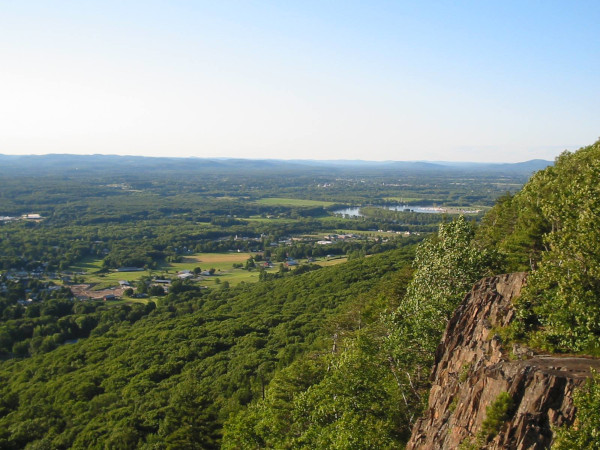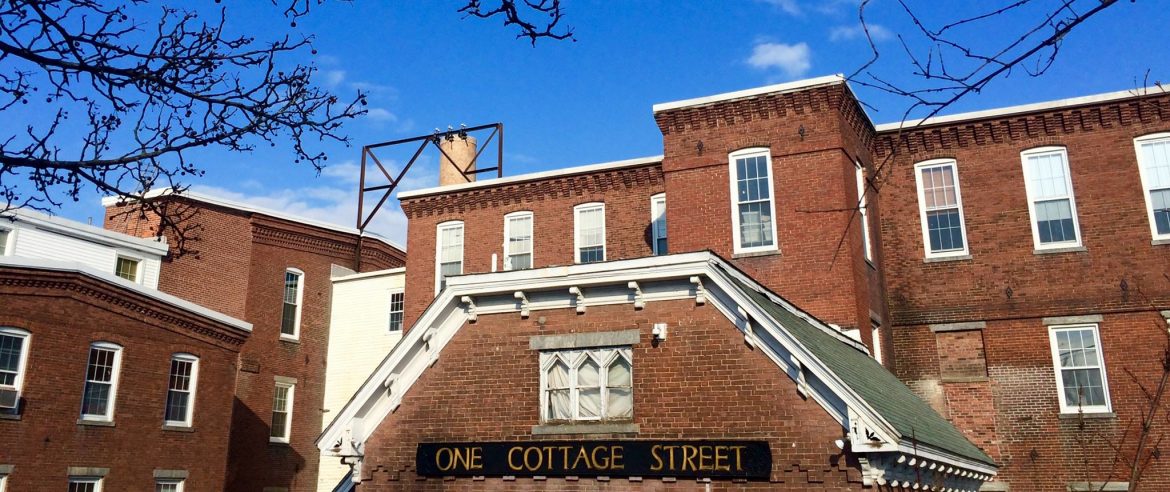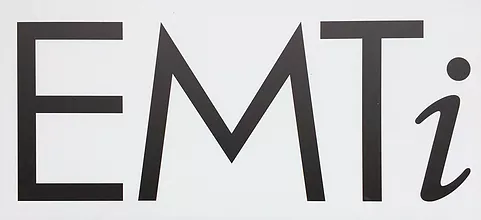Easthampton, Massachusetts
Not your ‘run-of-the-mill’ city
Green View Magazine interviews Nicole LaChapelle, Mayor of Easthampton, Massachusetts, for our focus on Sustainability in American Cities.
Blessed with the rich heritage of an industrial New England village, the city of Easthampton, Massachusetts is undergoing a brilliant re-visioning of the past, driven by an atmosphere of entrepreneurial spirit and well-designed development. The city’s 16,000 residents enjoy living, working, and playing in this scenic, former mill town that is now home to a vibrant and diverse business community, municipal forward-thinking governance and capital investments in the city’s schools.
Old mill buildings, once bustling with manufacturing enterprises, now hum with creative and cultural activities. The boardwalk, surrounding the Nashawannuck Pond in the center of the city, serves as a gathering place for leisure activity. A six-mile-long bike path running from the Southampton border to Northampton and beyond offers enjoyment for all ages – whether walking, running, roller blading, or cycling – while the popular monthly Art Walk showcases the arts scene at its creative best.
In a recent interview with Business View Magazine, Easthampton Mayor, Nicole LaChapelle, shared her insights into this delightful city’s background, the many progressive initiatives currently in the works, and the very bright – and “green” – future outlook. The following is an edited transcript of that conversation.

BVM: Can you describe Easthampton from an economic development standpoint?
LaChapelle: “Easthampton is a former mill town with a firm agricultural base and industry. When the mills started to close down in the 1940s and transition out into the ‘70s and ‘80s, what popped up in its absence was a small precision machine and tool and die shop industry that has spurred and anchored manufacturing in Easthampton and, as a result, has attracted artisans and middle-class workers. For decades, artists were renting the old mill spaces for studios and are home to numerous far-reaching businesses. What once was an internal art scene has grown organically to now be an outward facing element of our success. There is a lot of pride and innovation, here, and our history as a mill town really informs our innovative, broad approach to community and commerce. In 2013, we were one of the first Cultural Districts in the State to see the creative economy as a joint endeavor between artists, makers and small businesses ; where art is not just a passive presence in the community, but really sparks economic drivers and jobs in the arts and related industries.
“From that 2013 cultural district initiative, lots of private and public money went into our existing mill buildings, two in particular, to create maker spaces – artisan spaces, bookbinding, woodworking, on a very high level. From there, we got very calculating as a city, as to where the local economy could go with those bases, as well as preserving our natural resources. As I took office, I looked at federal and state economic development tools and incentives and instantly targeted our mill district. We have one very complex mill property left – we started with that, obtaining opportunities and designation and doing a vertical stacking of state programs to bring economic development and mixed-use commercial into our mill district.
“That resulted in a $3.5 million public infrastructure grant from the state that was leveraged to $43 million of private investment. That project will put 60,000 square feet of mixed-use commercial space and between 100-150 new residential units on the Easthampton market. It is centered 12 miles from the Mass Pike and Barnes Air National Guard Base with easy access to the five-college area and into Holyoke and Chicopee, where there are large industrial parks. This particular project caps off our mill district, which has four other mills that are mixed-use, including a retail cannabis dispensary, professional offices, and some rentals. It is accessible from the Manhan Rail trail and Millside Park has become a hub of events and activities which has helped attract developers looking at those opportunity zone parcels for mixed-use and light industrial.”

BVM: What makes Easthampton attractive as a place to live?
LaChapelle: “Our tax rate is extremely low ($15.45 per thousand). We’re a very thrifty city and our housing market and commercial properties show that. Housing stock is tight, but we’re working to put more housing units throughout the city, as well as opportunities for accessory dwelling units. We’ve had a lot of success with that. Additionally, we have obtained money to add onto the Valley Bikeshare program that will be putting electric-assist bikes throughout the city. By linking to five other surrounding communities, it makes the Valley Bikeshare program in Easthampton, not only a wonderful recreational opportunity, but a true commuting tool for folks to get to Holyoke, a larger city to our south, as well as to South Hadley, Amherst, and Northampton.
“We’re just starting to prepare a Downtown Strategic Plan that will focus on the potential reuse of three elementary schools that will become available in 2023.. The total redesign of one of our main thoroughfares is now 25 percent done and will be funded through the Massachusetts TIP program in 2022. It will bring a main retail corridor into a Complete Streets program that encourages pedestrian and cycle traffic and connects to the mill district. We’re also in the process of acquiring 11 acres on the side of Mount Tom; it will be one of the few vantage points looking out onto the Pioneer Valley that will have a handicapped accessible trail and connection to the popular New England Scenic Trail. We’re very proud of that.
“We passed a public ballot to consolidate our pre-K through 8th grade schools into one. We’re in the plan/design stage and are set to go out to bid on that project in August of this year. That will be a state-of-the-art campus for 1,000 of our school children in a beautiful area just outside our downtown, surrounded by protected environmental areas and wetlands with a gorgeous view of the mountains. Our high school students are also in a new building that was finished in 2013. So, you’re looking at a small city where every one of our public-school students will be in a school that’s relatively brand new. That has really bolstered the confidence of residents in the investment and work our city is willing to put into public schools for people looking to move here.”
BVM: How are you attracting business development?
LaChapelle: “We’ve done a lot with budgeting. Our forecast model and capital investments in our city look fantastic. Just this April, Standard & Poor’s upgraded the city’s bond rating to AA+ – the highest such rating in the last twenty years. We have a great planning department; working with developers on technical applications, opportunity zones, DIF’s and TIF’s, local incentives around energy, and encouraging green community activity and development. We have been working closely with our Chamber of Commerce to get out the word of our flexibility; that we’re business ready. We acknowledge and support our existing businesses and entrepreneurs around tech and education professional services to make that transition into Easthampton as easy as possible and ensure profitability.
The planning shift in Easthampton has gone from a reactionary year-by-year budgeting model to one that’s looking out proactively, five and six years, not just on expense but also on revenue and investment. We’ve become really granular about what works for Easthampton. Our thriving machine shops, the award-winning restaurants – that’s brought together an eclectic sense of innovation and adventure but also a high quality of life at a very reasonable cost of living. With those public infrastructure grants, we’re looking forward at what we will do around energy savings; starting up a telecommunication advisory committee that has very aggressively looked at municipal plans to better our access to broadband. That’s key for education and businesses.”
BVM: Is environmental sustainability on your agenda?
LaChapelle: “Definitely. We have a designation as a Green Community. We switched over to LED in all our municipal properties and we’re starting to upgrade that system. We’re also working with Mass Save (a Massachusetts energy and utilities collaborative) and energy audit companies to get them out to our residential and commercial owners to look at energy savings. We’ve just applied for funding to install our first four EV charging stations to put at key points in the city; also, putting additional solar on municipal buildings. Our high school has solar on it, as will our new school, and expanding that solar opportunity to other municipal buildings is a big focus. Between the solar field on our landfill and the new school, savings have been substantial.
“We are actively pursuing public infrastructure money, looking at the Municipal Vulnerability Project. We’re in the middle of a feasibility and prioritization project, then we’ll go after a larger grant in the next year, looking at storm water and wastewater management projects that we must get done. We’re thinking forward.
Lessening that carbon imprint by municipal buildings and having a very large commitment to the environment, as well as green initiatives and working with developers around employing those principles when they’re building out, are all things we’re very proud of in Easthampton. And there’s much more to come.”
AT A GLANCE
Who: Easthampton, Massachusetts
What: City on the SE edge of Pioneer Valley; population approx. 16,000
Where: Hampshire County, Massachusetts
Website: www.easthamptonma.gov

